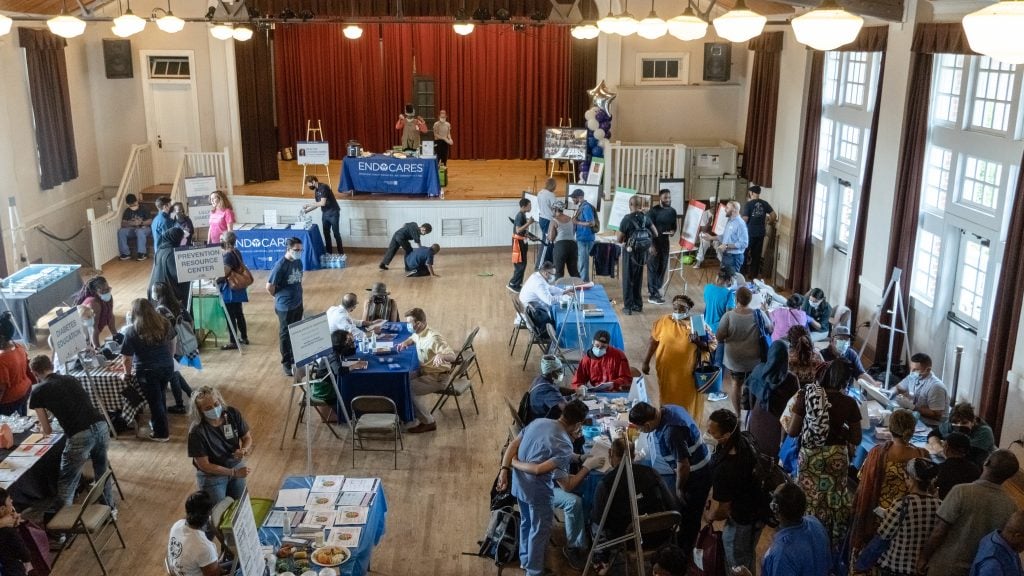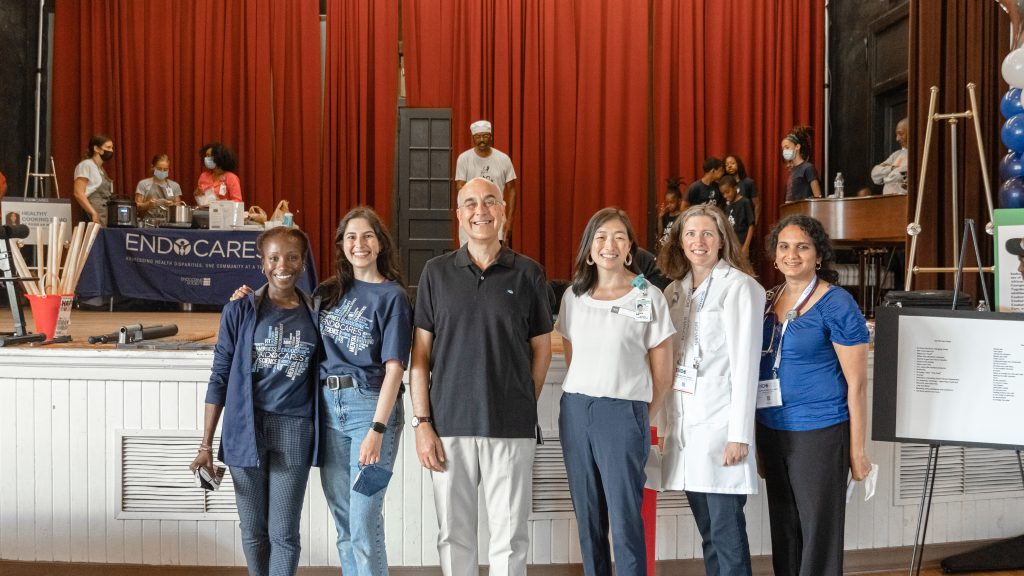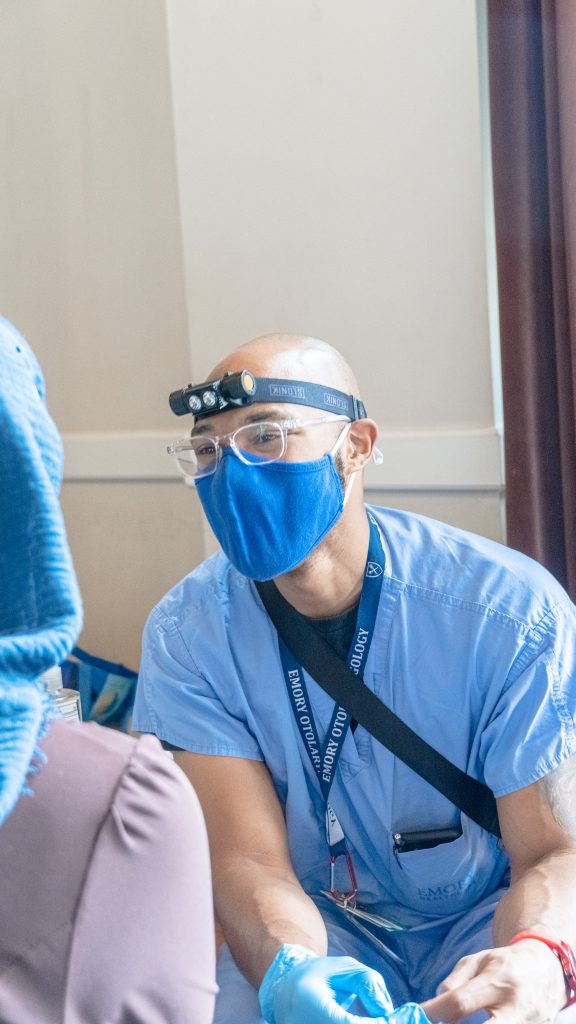
During ENDO 2022, the Endocrine Society made a community-wide “house call” with a flagship EndoCares® event that brought care and compassion to an underserved population.
On Saturday June 11, the atmosphere at the Clarkston Community Center in Clarkston, Ga., could only be described as festive.
The red brick building was filled with neighbors visiting with each other while children ran through the crowds laughing when they weren’t working on craft projects. The air was filled with the mouthwatering aromas of delicious food while an array of dancers took to the stage. An overriding sense of community spirit was evident in this town that is little over a square mile in size but whose occupants speak more than 60 languages. And as typical with any municipal event, local politicians were mingling with their constituents.
But this wasn’t a community fair or carnival, it was the flagship EndoCares® conducted by the Endocrine Society during ENDO 2022, that saw more than 200 immigrants and refugees from Clarkston area gathered at the Clarkston Community Center for EndoCares® Atlanta, a health fair offering free screenings and resources to the local community.
Volunteers from the Society, Emory University, Grady Memorial Hospital, and other health organizations screened people for diabetes, obesity, and hypertension, gave over 100 COVID-19 vaccines, and provided free health education resources to help connect people to local healthcare systems and live healthier lifestyles.

EndoCares® is an outreach program that seeks to serve individuals and families from underserved/underrepresented communities, who are affected or might be affected by endocrine-related conditions. These health service days are a welcoming, inclusive, and caring environment that provide free onsite healthcare screenings, wellness coaching, and education materials. “EndoCares® gave me the opportunity to learn more about the community in which my patients live and work,” says J. Sonya Haw, MD, assistant professor at Emory University School of Medicine and medical director of Grady Memorial Hospital in Atlanta, Ga. “I learned about specific barriers and challenges to accessing and sustaining healthcare and fostered meaningful relationships with some of the community partners.” Haw was also an integral part of planning the event.
A Close-Knit Community
Not every community is as close knit as Clarkston, where word of mouth and a well-established community center attracted a big crowd of immigrants and refugees from Afghanistan, Tanzania, Congo, and other underserved parts of the world. Having flyers and ads on billboards and highways translated into five different languages (Dari, Swahili, Burmese, Arabic, and Pashto) was also essential in drawing more people to the event.
“It was really nice to see an immigrant community that we don’t typically see in Atlanta in our clinic,” says Priyathama Vellanki, MD, during a recent interview with Endocrine News Editor Mark A. Newman at ENDO 2022. Vellanki is the medical director at Grady Endocrinology Clinic, a safety-net hospital in Atlanta that treats underserved and uninsured patients. “It really highlighted how important diabetes care and screening for hypertension is for this population.”
“I believe that healthcare systems need to work closely with community organizations, leaders, and patient advocates to gain trust, identify specific causes for gaps in access, and work together to create effective and sustainable interventions.” – J. Sonya Haw, MD, assistant professor, Emory University School of Medicine; medical director, Grady Memorial Hospital, Atlanta, Ga.

Social workers and volunteers from Grady Health, Emory University, Georgia State University Prevention Research Center, and other nonprofits and patient education groups such as Beyond Type 1 and Lilly Diabetes provided free resources and more information on how to find affordable and accessible health care. Volunteers from ENDO were also shuttled back and forth to give talks and screen patients.
Health Screenings to Save Lives
There were cholesterol screenings, A1C tests, and “no judgement zone” counseling services. Onsite clinicians screened over 50% of attendees for diabetes, performed lipid panels on 23% of people, and screened 40% of patients for hypertension. They diagnosed several new cases of diabetes and hypertension — four people were treated for hypertensive crisis and two were sent to the emergency room, highlighting the immediate need for these screenings.
“There was a line that was out the door and down the hallway for the real-time healthcare screenings for A1C, BMI, blood pressure, and cholesterol, and people were very interested in being able to talk to a doctor, one on one, after their results. Even if the results were normal, just to learn ‘what does this mean for me and my health’,” says Melanie Haines, MD, during the ENDO 2022 Endocrine News interview. Haines is an assistant professor at Harvard Medical School and an assistant physician at Massachusetts General Hospital in Boston, Mass. She currently serves on the Endocrine Society’s Patient Engagement Committee.
Clarkston Mayor Beverly H. Burks and Vice Mayor Awet Eyasu stopped by the event to show their support and encourage the community to stay healthy and keep up with screenings. Vice Eyasu shared his personal story of immigrating from Eritrea and gaining more than 80 pounds, how he worked to shed it all, and how he stays active and healthy. He is a huge advocate for healthy lifestyles for immigrant and refugee families in Clarkston.
Many people at the event had never been to the doctor, much less screened for diabetes or hypertension because of lack of insurance, low income, food insecurity, no transportation, and language barriers, just to name a few obstacles. Having translators onsite and materials in different languages helped direct people to the various screening stations and made communicating with clinicians easier.
Compassion Transcends Language
“At Grady Hospital, we have ample access to in-person or video/phone interpreters for all encounters,” Haw explains. “But more than having an interpreter, I think that ensuring we are showing compassion and patience is the foundation for ensuring trust, especially with patients who speak a different language. Authentic compassion, care, and patience transcends language.”
She offered the following advice for patients and their family members who have limited access to routine care and healthy foods: “Oftentimes healthcare systems will have social workers and resources available to help with things like transportation, food insecurity, low-cost medications, and even employment opportunities. Don’t be afraid to ask your doctors or nurses.”
“I think that ensuring we are showing compassion and patience is the foundation for ensuring trust, especially with patients who speak a different language. Authentic compassion, care, and patience transcends language.” – J. Sonya Haw, MD, assistant professor, Emory University School of Medicine; medical director, Grady Memorial Hospital, Atlanta, Ga.
Many people in Dekalb County struggle with access to healthy food, so another major theme of the event was educating people on eating healthier and being more active. There were healthy recipe handouts, live food demonstrations, and a nutritionist who spoke at the event. There were dance demonstrations as well to encourage the community to try fun and different ways to exercise. The Society served healthy lunches to attendees and donated over 400 leftover meals to a local food pantry, the homeless population in downtown Atlanta, and low-income persons near Grady Hospital.
Creating Effective and Sustainable Interventions
The EndoCares® program aims to change healthcare behaviors in the community to improve long-term health and encourage routine care. Getting people connected to the local healthcare system is the first step, but the goal is getting patients to change their diet and exercise routine and receive regular screenings.
“One of the things that we’re thinking about is making sure that this is not individuals’ only interaction with the healthcare system, that we’re really using this as a first interaction of many,” Haines told Newman. “So, there were healthcare plans, there were clinics on site, including Grady, to make sure that individuals could get connected with the healthcare system.”
“I run the Endocrinology Section at Grady Memorial Hospital, and it really opened my eyes as to planning new programs and thinking more long term on how we can get better access to diabetes care,” Vellanki added.
When asked about closing the gap in access to care for people in her community, Haw says, “I believe that healthcare systems need to work closely with community organizations, leaders, and patient advocates to gain trust, identify specific causes for gaps in access, and work together to create effective and sustainable interventions.”
Williams is the senior communications manager at the Endocrine Society. She wrote about the newly expanded EndoCares initiative in the May issue.
All Photos by Malek Alarmash

